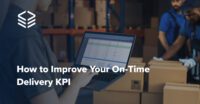Before we discuss Amazon FBA alternatives, we need to understand more about Amazon’s FBA. Let’s face it, Fulfillment by Amazon (FBA) set the bar high for e-commerce businesses. The Amazon Fulfillment network has the resources, technology, and capability to provide free, fast, flexible shipping to anywhere on the planet.
Same day shipping is quickly becoming the norm, and for an ecommerce business, the only way to meet customer expectations is to hand over fulfillment and customer service requirements to Amazon fulfillment. However, FBA isn’t for everyone, leading many Amazon sellers and brands to seek out Amazon FBA alternatives.
An ecommerce business has to “pay to play” in the market Amazon created, and an increasing number of online merchants are choosing to outsource their processes to 3rd party fulfillment services to reduce their dependence on Amazon.
FBA Fees, Compliance, & Branding
When it comes to pros and cons of selling on Amazon and using FBA, the majority of e-commerce businesses report an initial spike in profits after outsourcing their fulfillment services to FBA. However, much of that profit is consumed by Amazon FBA fees like fulfillment fee consolidating, order handling, pick & pack, and weight handling.
The FBA fee structure is also subject to change. In 2018, Amazon implemented its Inventory Performance Index (IPI), which mandates the FBA seller pay higher rates to store slow-moving SKUs.
In addition to a strict fee structure, Fulfillment by Amazon also upholds strict compliance criteria mandating what, how, and when inventory items can be shipped to its warehouses – compliance flexibility is minimal, and heavy financial penalties are enforced for every compliance violation.
What’s more, when FBA ships your product, it doesn’t arrive in a box with your company’s branding on it. It arrives in an Amazon-branded box, which hands the customer experience to Amazon. More and more ecommerce businesses are looking for Amazon FBA alternatives to get more control and save money.
Amazon FBA Alternatives
Deciding to outsource your fulfillment services to a 3rd party other than Amazon has the benefit of lower costs, inventory flexibility, increased visibility, and greater control over your order fulfillment operations. In fact, choosing a third-party logistics provider other than FBA can be one of the best decisions an ecommerce brand business can make.
Revamp Logistics
E-commerce businesses can free themselves of the need to sell on the Amazon Marketplace by revamping their current logistics strategy. Modern logistics solutions, like automated warehouses make it easier for e-commerce businesses to scale their networks as demand for product increases.
In fact, with the right logistics strategy, product research, and a little help from digital logistics platforms, and variable data storage it’s possible for e-commerce businesses to create end-to-end supply chain visibility and wrest control of the customer experience away from Amazon, all together.
Seller Fulfilled Prime (SFP)
Seller Fulfilled Prime is an Amazon FBA alternative that allows qualified Amazon sellers to display the Amazon PRIME badge on orders they fulfilled via their own warehouse or a third-party service provider. SFP is similar to Amazon FBM (Fulfillment by Merchant), however, SFP requires using preferred carriers and matching FBA service levels to qualify.
With SFP, larger and heavier items are charged a higher fulfillment fee, with additional storage fees charged depending on the time of year – SFP is more expensive during the holidays since it’s the busiest shopping season for Amazon.
In addition, Amazon considers anything larger than 18 inches to be a large item, so the fees paid under FBA would be more expensive than SFP for larger items. For e-commerce businesses choosing to stick with Amazon and Amazon Prime, these fees are often the main factor that determines whether FBA or SFP is the more feasible option.
On-Demand Warehousing
Swimming against the tide of Amazon is On-Demand Warehousing, a warehousing and distribution model that connects available warehousing space with e-commerce businesses in need of a small amount of space, for a short amount of time.
Unlike FBA, On-Demand Warehousing enables retailers to dynamically deploy different inventory volumes to different warehouses across the country in little to no time. With no space minimums, e-commerce businesses can avoid overpaying for unneeded space – enabling efforts to expand previous distribution networks into a comprehensive and responsive supply chain.
Working with a 3PL Fulfillment Company
Most e-commerce businesses have little margin for the excessive fees attached to Fulfillment by Amazon. Combine the rising costs of Amazon warehousing with the lack of affordable warehousing space across the country and e-commerce businesses are faced with a decision – work with Amazon, or roll the dice with traditional warehousing.
Flowspace fills a desperate need for e-commerce businesses, enabling sellers to readily respond to demand without exerting the extra cost, time, and effort of complying with Amazons strict rules and excessive fees.
Flowspace provides storage, transportation, and all the warehousing services businesses need for their inventory month over month. What’s more, our Amazon integration service integrates seamlessly with the marketplace, so we take care of the picking, packing, and shipping of Amazon orders directly from our fulfillment center.
There are no space minimums, so e-commerce businesses can eliminate the issue of overpaying for unneeded space, improve the logistics network and even avoid selling through Amazon all together. With 500+ warehouses nationwide, Flowspace is the perfect fulfillment partner solution for e-commerce businesses that are looking for Amazon FBA alternatives. Get started today!





